- Home
- J. F. Penn
One Day In Budapest Page 4
One Day In Budapest Read online
Page 4
“All of this is portrayed as history,” Zoltan said. “But many survivors are still alive, and plenty of perpetrators have been left unpunished. The scars of this terror are still raw and the wounds easily reopened.” He shook his head. “Sometimes I think that our country is so steeped in blood that the ground has become viscous with it, and one wrong step will suck us all into the maw of the earth.”
Georg chuckled. “So poetic, my friend.”
Morgan expected Zoltan to be offended at the sarcastic tone, but he merely smiled and shook his head.
“Georg here is a gamer and hacker, and he associates with those who stand for anarchy and revolution.”
“What he means is that I know the truth,” Georg replied, his kohl-rimmed eyes suddenly serious. “I hack to remain anti-establishment, to keep an eye on those in power and to hold them to account. I don’t believe in the innate goodness of mankind, so I seek to ensure that there are balances in place to prevent the rise of such sickness again.”
“Why do you work here, then?” Morgan asked. “Surely this place represents everything that you hate?”
Georg nodded. “True, but I would have been one of the first to be thrown to these butchers, just for being different. Every day I confront the bullies of the past and I claim my right to be who I am. As you see, there are still people who want to return to the past, slam people like me and Zoltan into cells and leave us to rot.” The lift jerked to a halt. “Come, I will show you why working down here keeps me motivated.”
The lift opened into the dungeon of the museum and Morgan followed Georg into the stone corridors as Zoltan trailed behind.
“These are where the prisoners were kept,” Georg pointed left and right as they walked indicating where thick doors opened onto cramped cells. Each contained only a dirty wooden pallet and pictures of faces on the walls. Morgan peered into one and saw scratches in the plaster, the marks of desperation an attempt to cling to life for just a little longer. She closed her eyes, the echoes of torture reverberating in her mind. For a moment she felt utterly bereft, with a realization that humanity had always tortured and murdered and always would. Was there was no stopping that darkness, despite how many fought against it?
She clutched at the wall.
“Are you alright?” Zoltan’s hand was on her elbow. Morgan opened her eyes to look into his concerned face. Behind him she saw Georg watching her, and she knew that he understood. These men stood against the dark, and she would stand with them. ARKANE usually fought in the realms at the edge of the supernatural, but the violence in Budapest was altogether human.
Morgan nodded. “I’m fine. Let’s continue.”
“It’s just a little further,” Georg said, turning and walking deeper into the dungeon labyrinth. “I find it best to work in places that others prefer to avoid.”
As she followed, Morgan paused again to look into a stark stone room. Although the ceiling was low, there was still space for a tall wooden pole with a few steps leading up to it on either side. A simple rope noose hung there, its knot silhouetted on the wood by the bare bulb that lit the pale space. The cell was made somehow more obscene by its emptiness and Morgan felt that the air still held imprints of the murders carried out there. For it was certainly murder, even though it had been justified by a government as a fitting punishment for enemies of the state.
Georg unlocked a door at the end of the long corridor and the three of them squeezed into another cell, barely big enough for a desk and a couple of chairs. On the desk sat a huge, clunky computer from the 1980s.
“It doesn’t look like much,” Georg said with a cheeky smile. “But this is Budapest hacker central. Now let’s take a look at these right-wing lunatics.”
He pulled out the chair and sat down at the desk, lifting the old computer to reveal a slim laptop underneath, hidden in plain sight. Georg opened the laptop and his fingers flashed over the keyboard. Morgan was reminded of the ARKANE librarian Martin Klein, whose genius skills were harnessed in the pursuit of esoteric truth. But where Martin was often physically awkward, Georg’s presence seemed to intensify as he worked, exuding energy and passion for his quest. Morgan could see that this was a kind of game to him, albeit with serious consequences, a battle of good vs evil in a parallel world where he could work his magic undetected.
“Can you check the chatter on the Eröszak forums?” Zoltan asked. “See if there’s any mention of who was involved in the Basilica theft and murder?”
Georg’s eyes were fixed on the screen and he didn’t reply, just typed faster, his brow furrowing as he read. Morgan could almost see him processing, sifting the information and weighing its importance. The Secret Police would have certainly killed him for being different, she thought, but he would have made a hell of an informant.
Minutes went past before Georg spoke, and Morgan could almost feel Zoltan’s impatience beside her. She understood his need for action, it was mostly her own preference, but they needed at least some indication of where to start searching.
Georg’s eyes widened and his already pale face blanched.
“What is it?” Zoltan asked.
“There’s chatter about a revenge attack,” Georg’s eyes were hollow, a corridor of time that reflected the massacres of the past. “No specific details but it sounds like a group of Jews have been shot on the banks of the Danube.”
Zoltan pushed back his chair with a violent shove, his face contorted, fists tight. His rage seemed to fill the tiny space but just as Morgan thought he would punch the wall, he laid his forehead on the cool plaster and breathed a long exhalation.
“Surely there can be no doubt that this is the work of ultra right-wing nationalists?” Morgan asked, her voice tinged with horror. “Won’t the police be investigating this as a matter of urgency?”
“But they’re only Jews,” Zoltan growled, his voice low. “Just recently, Eröszak supporters marched near a hotel where the World Jewish Congress was meeting. The protestors wore military uniforms, forbidden and outlawed in Hungary, but the police let them march.”
Georg nodded.
“Eröszak currently has one third of the Parliament, but across the country the support is much more widespread. And you can see why. Their ‘Movement for a Better Hungary’ has been embraced as a way to combat unemployment, crime, immigration, and the dependence of welfare cases like the Roma. Jews are again seen as too powerful, a useful scapegoat in a country where we have been murdered and driven out before. These murders will be investigated, but they won’t search too hard for those responsible and it won’t help us today.”
While he spoke, Georg’s fingers flashed over the keyboard. “The incident has brought out the big-mouths on the forums. The boasters, the braggers.” His face twisted into a sneer. “Idiots.” His eyes scanned the pages, while Zoltan still stood against the wall, finally turning to lean against it, his body taut with restrained power. Finally, Georg spun the laptop around for them to look.
“This man was seen in the delicatessen from where they took the victims. He didn’t even hide his face, which just shows you the confidence the bastards have.”
Morgan and Zoltan leaned closer to the screen. The man was elegant, his features finely chiseled and his nose long and sharp, his black hair slicked into a stylish wave.
“Hollo Berényi, known as the Raven,” Georg said. “He’s linked to many anti-Semitic attacks as well as to violence against Roma. There’s no clear evidence that he’s part of Eröszak and, of course, their leader, that slime-ball László Vay, always condemns the violence, but they must be linked somehow. Everything Berényi does furthers the Eröszak cause.”
Zoltan grunted. “A few days before the election? Of course it’s them. Who else has so much to gain?”
Georg continued. “Some of the chatter indicates that Berényi was also seen around the Basilica early this morning.” He clicked another key and more blurred images of the man filled the screen. “Under another name, he spent several years with the Russ
ian Spetsnaz GRU elite military force before disappearing off the radar, surfacing occasionally as a mercenary in various wars. It seems that he offers military strategy for hire, so I think it best to focus on him and what he has been doing.”
“Or consider what he might do next?” Morgan said.
Both men looked at her, waiting for more.
“It seems to me that the murder in the Basilica and the theft of the Holy Right has enraged the nation,” she continued. “So much so that almost anything would be considered acceptable today, even these murders by the Danube. While the Hand is missing and the Jews blamed, this Berényi can do his worst and be considered a folk hero. From what you’ve said, I don’t think he’s finished yet.”
“Of course.” Georg spun the laptop around again and resumed his tapping. “The police will have to investigate all this, but while there is chaos, they’ll just let it ride.”
“So if you were going to target Jews in retaliation,” Morgan said, “but also escalate the situation by tapping into Hungary’s past and attacking symbols of nationalism, what would you do next?”
In the moment’s silence that followed, a siren rang out in the building, a deafening ‘nee-naw’ cacophony. Morgan and Zoltan pressed their hands over their ears while Georg’s face froze, as if that sound conjured up a history that he thought lay only in the past.
CHAPTER 6
“It must be just the fire alarm,” Georg shouted over the din, “but it can’t be a coincidence that you’re here.” He pressed a key combination and the laptop shut down, encrypting his work. He replaced the ancient machine over the top, then grabbed a small padded case as he indicated the door. “Come on, we must get out of here.”
As they ran through the winding corridors of the basement level, Morgan caught glimpses into the rooms they passed. One was stacked with the clothing of those long dead and another filled with crosses illuminated only by candlelight. Eventually the three came to an exit and Georg led them up a tiny staircase. He pushed open the door at the top carefully, inching it open to check the suburban street beyond.
“You must go,” he said. “If the police are pulling in people for questioning, you can’t be caught or they’ll keep you in cells while the Raven rampages out there. I’ll go back down to join the evacuation.”
“Köszönöm,” Zoltan said. “Thank you, my friend.”
“Take this,” Georg handed Zoltan the padded case. “It’s a video camera that will upload via wireless or phone networks to my account. If you can get evidence of what’s really going on, I can get it to the press. It’s the only way to stop this madness. Words will no longer be enough.”
As Zoltan put the camera in his pack, Morgan leaned in and kissed Georg’s cheek. “We’ll stop this, Georg and it will be thanks to you.”
They walked quickly away from the building along Andrassy Boulevard, blending into the crowds who were ogling the scene and snapping photos in their eagerness to be a part of the day’s drama. On the other side of the road, Zoltan hailed a taxi, telling the driver to take them towards Buda Castle. As they sped off, a news bulletin came on the radio and the driver turned it up to listen.
***
“Breaking news from the centre of Budapest with reports of violence on the banks of the Danube. Five bodies have been retrieved from the river with gunshot wounds, and the shoes of the victims have been found amongst the iron replica Shoes on the Danube memorial.
An anonymous phone call to the Magyar Hirlap news desk has claimed the murders in retaliation for the theft of the Holy Right, stolen this morning from St Stephen’s Basilica, and the brutal murder of Father Zoli Kovács. The anonymous caller threatened further violence until the Holy Right is returned. There are reports of running battles throughout the city as Jewish groups and right-wing nationalists clash. The authorities are struggling to respond to so many concurrent incidents and the police are calling for calm as they proceed with their investigations.
László Vay, leader of the Eröszak party, has just released the following statement.
‘Fellow Hungarians, we are all struggling to deal with the terrible theft of the Holy Right, but violence against the people who did this is not the answer. So I ask you for calm today in this beautiful city of ours and let the police do their job.’
Even as László Vay calls for calm, there are reports coming in of a man climbing the Széchenyi Chain Bridge overlooking the Danube. There are no indications of what he’s doing up there but we’ll bring you updated news as we receive it.”
***
The news bulletin finished and the radio segued into a pop song.
“Bastard,” Zoltan said. “Vay stokes the fires even with his careful words. I bet whatever’s happening on the bridge is down to him as well.” He leaned forward to speak to the driver. “Széchenyi Bridge.”
The taciturn driver nodded and pulled into another lane.
“Why is the bridge so important?” Morgan asked, her eyes fixed on Zoltan’s face, which was creased with worry.
“There are few things that symbolize nationalism for Budapest better than the Széchenyi Bridge,” he said. “Designed by an English engineer and opened in 1849, it was the first permanent bridge across the Danube, joining the two halves of Buda and Pest. It was considered an engineering wonder of the world at the time, a symbol of the strength and might of our Empire. In those days, we were kings.” Zoltan smiled as if in reminiscence, but then his eyes clouded with shadow. “You know some of Hungary’s suffering during the Second World War, but in 1944 we tried to withdraw, even though we were allied with Germany. Hitler wouldn’t stand for it and sent German troops here, installing the far-right Arrow Cross party. But Stalin was determined to make an example of Budapest and the Red Army advanced with over a million men.”
Morgan imagined these streets filled with soldiers and frightened people preparing for the impending inevitability of war. Zoltan continued the story.
“With Germans and Hungarians trapped within, Hitler nevertheless declared Budapest a fortress city, to be defended to the last breath of every man. The Siege of Budapest began, just as winter ravaged the city with cold so extreme that the Danube froze.”
The taxi was now speeding along by the side of the river, and as they rounded the corner Morgan saw the bridge. Two classical stone arches stood triumphant near the banks and, slung between them, elegant iron suspension cables seemed to hold the structure weightless above the water.
“In January 1945, the Germans couldn’t hold the Soviets back and retreated across the river into Buda, destroying all of the bridges as they went, including this one. Only the pillars were left.” Zoltan sighed, as if recalling those dark times. “But it didn’t stop the destruction. In February 1945 the German and Hungarian forces surrendered. Hundreds of thousands of people were killed or taken to the Soviet labor camps and eighty percent of the city was destroyed or damaged.”
Zoltan fell silent and gazed at the bridge as their taxi slowed. Morgan put her hand on his.
“I can see why the bridge means so much,” she said. “But I guess it also symbolizes that Budapest can rise again from disaster.”
Zoltan nodded. “And if today is about desecrating symbols of nationalism in order to enrage a nation, the bridge is an obvious target.”
The taxi pulled to a halt on the Pest side of the bridge and Zoltan paid the driver. Morgan took in the view across the mighty Danube to Castle Hill beyond, the Royal Palace dominating the skyline with its imposing facade. Her eyes dropped to the bridge itself as Zoltan joined her on the side of the main road that ran onto it.
“It’s unlikely that this group would expect to destroy the bridge,” she said. “They just want something symbolic to blame on the Jewish population and further stoke the fires of unrest.”
Zoltan nodded. “I think that they might be saving the finale for the synagogue tonight, and the main aim today is to fire up the mob.” He shook his head. “Sometimes there are days when I look to the sky and see o
nly deep blue, a hope of happiness in a world where we have learned to live together in peace. But the storm clouds are never far from this city.”
He pointed towards the Parliament building where a swarm of police and media were gathered at the Shoes on the Danube memorial. “We cannot seem to escape the wheel of history that brings violence over and over again.”
“But we have today,” Morgan said, turning to him. “If we can find the Holy Right, we may be able to stop the escalation. The synagogue would be safe.”
Zoltan smiled, his scarred cheek furrowing.
“I’m glad to have you here, Morgan. An outside view helps when the melancholy grows too dark. Come then, let’s see what we can find.”
Together they began to walk across the bridge as cars accelerated past, their occupants oblivious to the possibility of disaster. Morgan scanned the walkway, her eyes narrowing as she studied each of the people approaching. In Israel, it had been a core part of military training to spot possible bombers and to be vigilant of danger in a new environment. That kind of awareness never leaves you, she thought, even though she had tried to escape that aspect of her past.
Morgan felt the ghost of her father by her side as she walked. Even though he was Sephardi, he had lived amongst Ashkenazi, Jews of Eastern European ancestry, and some of his friends had escaped this very city. Morgan’s thoughts flashed to Elian, her husband, who had died in a hail of bullets on the Golan Heights. Defending the community here felt like a tribute to his memory.
As she looked out to the Danube, Morgan saw one of the many open-topped boat tours coming down the river. Tourists leaned out over the water, wrapped in scarves and gloves, but determined to take pictures of the majestic city. Her gaze shifted to the suspension cables, thick and stable, easy enough to scale quickly. Her eyes followed the cable up to where it met the towering classical arch and then widened in surprise. She grabbed Zoltan’s arm.

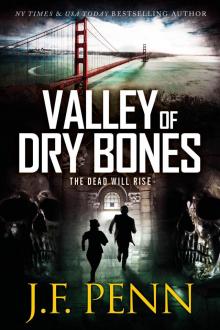 Valley of Dry Bones
Valley of Dry Bones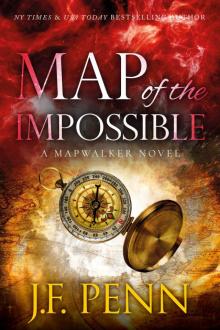 Map of the Impossible
Map of the Impossible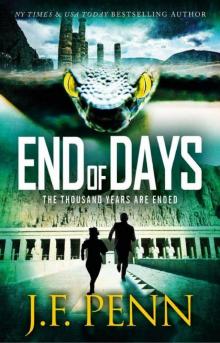 End of Days
End of Days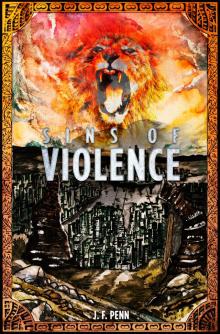 Sins of Violence
Sins of Violence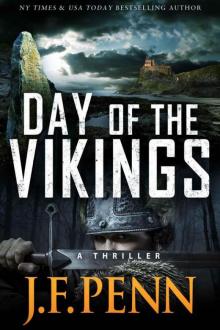 Day of the Vikings
Day of the Vikings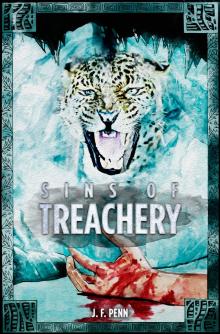 Sins of Treachery
Sins of Treachery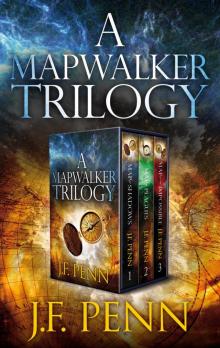 A Mapwalker Trilogy
A Mapwalker Trilogy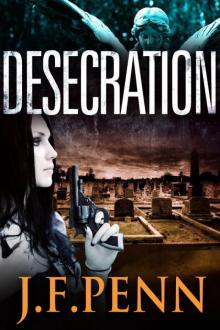 Desecration
Desecration Tree of Life
Tree of Life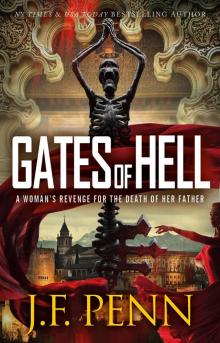 Gates of Hell
Gates of Hell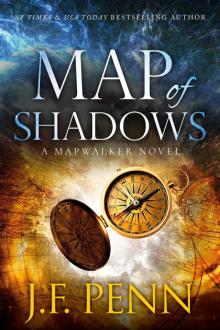 Map of Shadows
Map of Shadows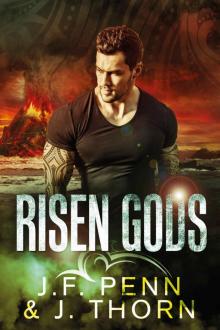 Risen Gods
Risen Gods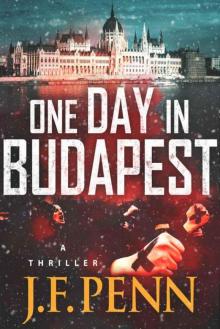 One Day In Budapest
One Day In Budapest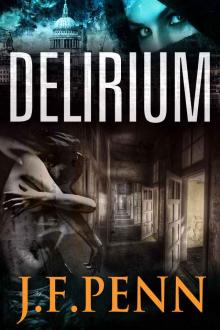 Delirium (London Psychic)
Delirium (London Psychic)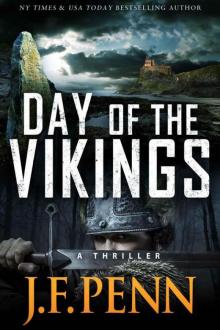 Day of the Vikings. A Thriller. (ARKANE)
Day of the Vikings. A Thriller. (ARKANE)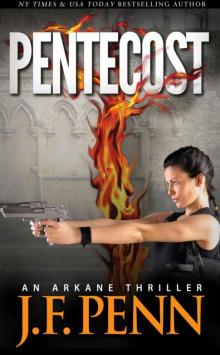 Pentecost. An ARKANE Thriller (Book 1)
Pentecost. An ARKANE Thriller (Book 1)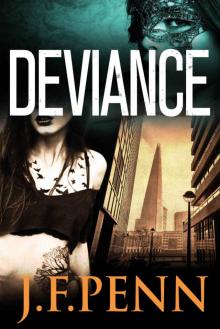 Deviance (The London Psychic Book 3)
Deviance (The London Psychic Book 3)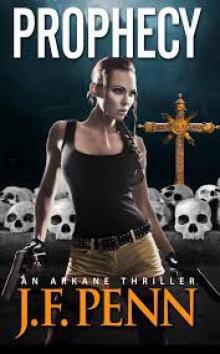 Prophecy. An ARKANE thriller. (Book 2)
Prophecy. An ARKANE thriller. (Book 2)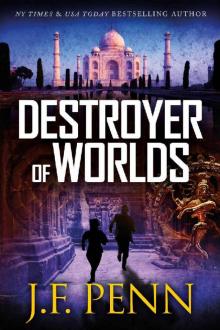 Destroyer of Worlds (ARKANE Book 8)
Destroyer of Worlds (ARKANE Book 8)